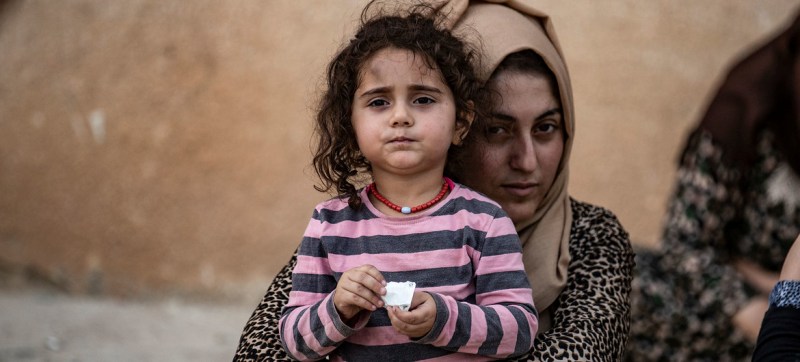 Women and Children Rights
Women and Children Rights Unilateral sanctions particularly harmful to women, children, other vulnerable groups
New York: Women, children and other vulnerable groups are more likely to have their human rights impacted by unilateral sanctions, an independent UN human rights expert alerted on Wednesday.
According to the independent expert, “unilateral sanctions hurt all, but are particularly harmful to vulnerable groups within the populations of countries targeted by the sanctions.”
Negative impact
For Alena Douhan, the Special Rapporteur on the negative impact of unilateral coercive measures on the enjoyment of human rights, the experience and negative effect when sanctions hit countries on a regular basis is not new, but “the impact is especially severe for vulnerable groups”, she alerted.
Besides women and children, those groups include indigenous people, people with disabilities, refugees, internally displaced persons, migrants, people living in poverty, the elderly, people affected by severe diseases and others, the statement continued.
Social or humanitarian aid “very often can’t be supplied because of sanctions, despite existing exemptions”, Ms. Douhan said, and the vulnerable groups are often those who rely and depend the most on aid and support.
“The complexity of sanctions regulations, combined with extraterritorial enforcement and heavy penalties, have led to widespread over-compliance with unilateral sanctions by entities out of fear of the consequences of inadvertent violations breaches,” Ms. Douhan added.
That results in banks being reluctant sometimes to finance aid or process transactions for humanitarian purchases, and transport companies refusing to handle shipments of humanitarian goods.
“Humanitarian NGOs have sometimes stopped operating in sanctioned countries because of these difficulties”, the rights expert said.
Women heavily impacted
Noting that sanctions often include fuel embargoes and prevent targeted countries from maintaining essential life-supporting infrastructure, such as food, water, sanitation, health and electricity supply systems, Ms. Douhan stated that “when countries can’t obtain fuel, medicines and medical equipment can’t be delivered and people can’t reach hospitals for medical care”.
This includes tests and control during pregnancies, for delivering babies, for vaccination of children and getting medical aid.
“Besides impeding the transport of people and goods like food, the lack of fuel and the inability to get spare parts hurts electric power generation, preventing electric pumps from supplying water for drinking and sanitation,” Ms. Douhan said.
In that case, and with women often being the ones who must go to obtain clean water for their families, they are the ones who are more impacted. Also, when sanctions cause economic activity to decline, women are typically the first to lose their jobs and be targeted by traffickers for sexual exploitation.
Sanctions a major threat to SDGs achievement
The rights expert noted that a country targeted by unilateral sanctions can “slide backward on the development scale”, and warned that “sanctions may be a major threat preventing targeted countries from achieving the universal Sustainable Development Goals that are meant to improve the lives of everyone”, particularly the lives of women, girls, elderly, people with severe or chronic diseases.
Calling, from a human rights point of view, to the United Nations, NGOs and other humanitarian actors to focus attention on vulnerable groups in sanctioned countries through ongoing monitoring and assessments of their human rights consequences, Ms. Douhan urged them to “intensify their engagement through collaborating where possible and developing greater solidarity to ensure that the necessary humanitarian support gets through”.
She also called on States and Governments that impose unilateral sanctions to “lift or minimize them as required by international law, to take all measures necessary to avoid the adverse effect on human rights of unilateral sanctions, to take all necessary measures to avoid over compliance with sanctions regimes, to provide broader exemptions, simpler procedures, and to facilitate, in spite of sanction regimes, the delivery of humanitarian aid.”
Role of Rapporteurs
Alena Douhan was appointed as Special Rapporteur on the negative impact of the unilateral coercive measures on the enjoyment of human rights by the Human Rights Council in March 2020.
Special Rapporteurs and independent experts, like Ms. Douhan, are appointed by the UN Human Rights Council to report and advise on specific country situations or thematic issues.
They are neither UN staff, nor are they paid by the Organization.
Image: UNICEF/Delil Souleiman
Support Our Journalism
We cannot do without you.. your contribution supports unbiased journalism
IBNS is not driven by any ism- not wokeism, not racism, not skewed secularism, not hyper right-wing or left liberal ideals, nor by any hardline religious beliefs or hyper nationalism. We want to serve you good old objective news, as they are. We do not judge or preach. We let people decide for themselves. We only try to present factual and well-sourced news.







